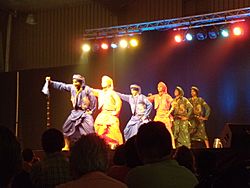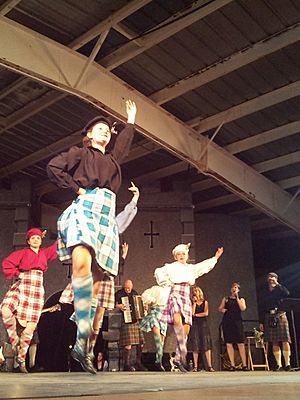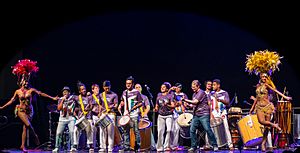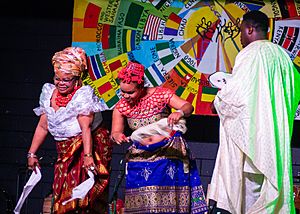Folklorama facts for kids
Quick facts for kids Folklorama |
|
|---|---|

Folklorama 2012 India Pavilion
|
|
| Frequency | Annually |
| Location(s) | Winnipeg, Manitoba, Canada |
| Years active | 56 |
| Inaugurated | 1970 |
| Next event | August 3–16, 2025 |
| Participants | 8,000 volunteers giving 300,000 hours (2022) |
| Attendance | 168,516 (2022) |
Folklorama is a big festival that happens for two weeks every August in Winnipeg, Manitoba, Canada. It's a chance for visitors to try delicious foods and celebrate the many different cultures that call Winnipeg home. Folklorama is known as the largest and longest-running multicultural festival in the world!
At the festival, each culture has its own special place called a "pavilion." There are usually more than 40 pavilions spread across the city. About half of them are open during the first week, and the other half open in the second week. Each pavilion puts on a show with music and dance from their culture. They also offer their unique ethnic foods and have displays about their traditions. Some pavilions even offer fun activities like henna tattoos or music workshops.
Folklorama helps different cultural groups share their heritage. It also brings thousands of visitors to Winnipeg each year. The Folk Arts Council of Winnipeg is the group that organizes this amazing festival.
The History of Folklorama
Folklorama first started in August 1970. It was originally a special event to celebrate Manitoba's 100th birthday. It was so popular that everyone decided to make it an annual festival!
The very first festival lasted only one week and featured 21 different cultures. Six of the original pavilions were Africa/Caribbean, Greek, Indian, Polish, Portuguese, and Ukrainian. About 50,000 people visited the festival that first year. In 1988, Folklorama changed to its current two-week format. This allowed more pavilions to participate, with half open each week.
The Folklorama logo was created in 1980 by Andy Stout. The logo shows four figures from different parts of the world. They are linked together with their arms raised, showing celebration and unity. The festival's fun mascot, the Folklorama Llama, was introduced in 1986.
For many years, each pavilion had a "mayor" and a "queen." The queen would compete in the "Miss Folklorama" pageant. This wasn't a beauty contest. Instead, it was about how well the queens knew and shared their culture. They were judged on their knowledge, participation, and personality. Since 1990, pavilions now have two adult ambassadors and two youth ambassadors. These roles can be filled by anyone, regardless of gender.
In 2019, Folklorama celebrated its 50th festival! Many different cultures participated, including African, Argentinian, Chinese, German, Greek, Indian, Irish, Italian, Japanese, Mexican, Scottish, Ukrainian, and many more.
Folklorama was paused in 2020 and 2021 because of the COVID-19 pandemic. But it came back strong in 2022 with 24 pavilions. The number of visitors increased a lot compared to 2019. In 2023, the festival grew even more, offering 40 pavilions for everyone to enjoy.
Folklorama Programs and Activities
Throughout the year, Folklorama offers different programs. These programs help share cultural arts and traditions beyond the main festival. They include "Folklorama at Home," "Folklorama at School," "Folklorama at Work," and "Folklorama at Play." These programs help people learn about different cultures all year long.
Festival Facts and Figures
- Each year, Folklorama usually has around 400,000 pavilion visits. In 2022, there were 168,516 visits to 24 pavilions. Many people visit more than one pavilion during the festival.
- About 21% of visitors come from outside of Winnipeg, showing how popular the festival is.
- More than 3,000 entertainers perform in over 1,500 shows during the two weeks.
- Festival-goers enjoy a lot of food and drinks! On average, 600,000 meals are served and 1,000,000 beverages are poured.
- Around 20,000 volunteers help make Folklorama happen every year. Their hard work is essential!
 | Claudette Colvin |
 | Myrlie Evers-Williams |
 | Alberta Odell Jones |




